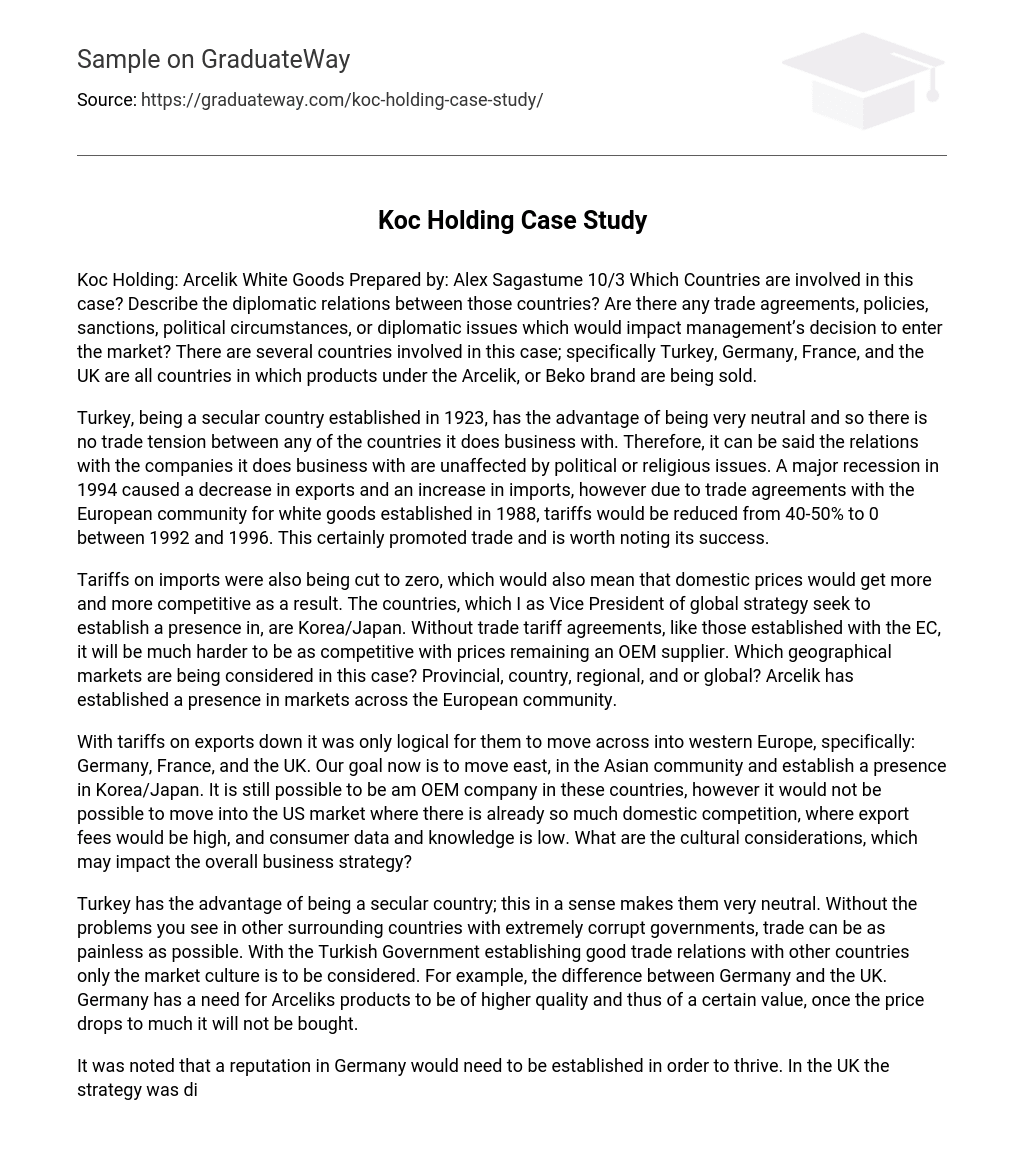What countries are involved in this case and what is the description of their diplomatic relations? Are there any trade agreements, policies, sanctions, political circumstances, or diplomatic issues that could impact management’s decision to enter the market?
Participating in this case are several countries, namely Turkey, Germany, France, and the UK. These countries all sell products under the brands Arcelik or Beko. Turkey, established as a secular nation in 1923, enjoys the advantage of neutrality. As a result, there are no trade conflicts with any of its business partners. Therefore, its relationships with these companies remain unaffected by political or religious factors.
The economic downturn in 1994 caused a decrease in exports and an increase in imports. However, the trade agreements made with the European community in 1988 for white goods led to a reduction of tariffs from 40-50% to 0 between 1992 and 1996. This had a significant impact on stimulating trade and should be acknowledged for its success.
Tariffs on imports are being eliminated, allowing domestic prices to become more competitive. As Vice President of global strategy, I am targeting the Korean and Japanese markets for expansion. Without trade tariff agreements similar to those with the EC, it will be challenging to maintain price competitiveness as an OEM supplier. Which geographical markets are being considered in this case? Is it provincial, country, regional, or global? Arcelik has already established a strong presence in various markets within the European community.
With reduced export tariffs, it made sense for our company to expand into Western Europe, specifically Germany, France, and the UK. Our current objective is to venture into the Asian market and establish a presence in Korea and Japan. While it is still feasible to be an OEM company in these countries, entering the US market would not be viable due to intense domestic competition, high export fees, and limited consumer data and knowledge. Therefore, we need to examine the cultural factors that could influence our overall business strategy.
Turkey, as a secular country, has the advantage of being neutral, distinguishing it from surrounding countries with highly corrupt governments. This favorable factor facilitates trade and minimizes complications. The Turkish Government has successfully established positive trade relations with other nations, focusing solely on the market culture. A prime example is the disparity between Germany and the UK. Germany’s demand for Arceliks products necessitates high quality and a specific value. Should the price decrease significantly, the products may not be purchased.
The establishment of a reputation is crucial for success in Germany, while the strategy in the UK involves lower prices to cater to the cultural preference for affordability over reputation. These divergent approaches can be attributed to cultural implications in each country. Germany, being more affluent and developed, has a higher standard of living, affording residents the luxury of selecting only top-quality products for their homes. Consequently, breaking into these discerning markets is challenging without an established reputation.
What cultural factors are present within KOC Holding’s company and its management team? The company’s culture, established by Vehbi Koc from the beginning, emphasizes aggressive entrepreneurship and a desire for significant growth, leading to its current status as an international competitor. Arcelik, a part of KOC Holding, takes pride in its streamlined management structure consisting of only four levels. Additionally, many top managers have received education from business schools in North America or Europe.
Koc has always emphasized the importance of future growth, as seen in the letter he wrote for his grandsons. In this letter, he challenges the third generation to expand both socially and globally. One key factor that has contributed to Arcelik’s success in Turkey is the significant unmet demand for white goods within the country. While 99% of households in Turkey own a refrigerator, only 3% of the population’s demand for white goods is met through imports. As a result, the domestic market was wide open for competition.
During the recession in 1994, Arcelik became known for its reputation and brand recognition as imports were significantly reduced. As an OEM company, Arcelik was able to produce high-quality products at low prices. This reputation was further solidified among older generations and gained traction among younger consumers through extensive advertising and marketing efforts. Now, the question arises: why is Bosch entering the Turkish Market and is it a threat? As Arcelik’s primary competitor, Bosch did pose a threat, but it was not overly significant.
Peg Profilo was acquired by Bosch-Siemens of Germany in 1995 and subsequently rebranded their products under the AEG name. They specialized in selling high-end appliances. To expand their market share, they opened multiple Bosch stores and launched an extensive advertising campaign. Arcelik, on the other hand, believed that their advantage in washing machines and dishwashers, areas they had not focused much on research and development, would give them a competitive edge against Bosch-Siemens. Additionally, Siemens had an already well-established network that they were likely to leverage.





